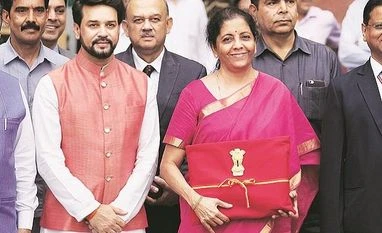Business Standard looks at some of the points that the finance minister is unlikely to tweet about, since these are still works in progress, are incomplete, or have been scrapped.
Budgetary targets: The 2019-20 Budget forecast nominal gross domestic product (GDP) growth for the year at 12 per cent. The deep slowdown has put paid to that outlook. The first advance estimates for 2019-20, released earlier this month, saw nominal GDP for the year come in at 7.5 per cent. This impacts all other assessments, including tax revenue forecasts and the fiscal deficit target.
The Centre’s gross tax revenue target for the year is Rs 24.6 trillion. Due to the corporation tax cut and expected lower collections from goods and services tax, analysts expect this to fall short by Rs 2.5-2.5 trillion. Around 35 per cent of this shortfall will be borne by the states.
The revenue shortfall is likely to impact the fiscal deficit targets as well. The Department of Investment and Public Asset Management is still racing against time to meet the divestment target of Rs 1.05 trillion, while the Finance Ministry has sought a Rs 2.2-trillion cut in expenditure in the January-March quarter.
Credit Guarantee Enhancement Corporation: This was announced by Sitharaman as a bid to deepen capital markets. It has not been set up yet.
New Minimum Public Shareholding Threshold: The minister had announced it was the right time to consider increasing minimum public shareholding in the listed companies and that she had asked the Securities and Exchange Board of India (Sebi) to consider raising the current threshold of 25 per cent to 35 per cent.
Sebi later said this would be difficult to implement.
Social Stock Exchange: The Budget had announced an electronic fund raising platform, a social stock exchange, under the regulatory ambit of Sebi for listing social enterprises and voluntary organisations so that they can raise capital as equity, debt, or as units like a mutual fund. A panel has been set up to study the feasibility of the proposal.
PMGSY-III: According to the 2019-20 Budget, the Pradhan Mantri Gram Sadak Yojana’s third phase envisaged upgrading 1,25,000 kms of road length over the next five years, with an estimated cost of Rs 80,250 crore. So far, the proposal is in its initial stages with agreements signed with a number of states.
Overseas sovereign bonds: This was one of the most surprising announcements of the last Budget, and Sitharaman and her officials backed it in subsequent public appearances. Behind the scenes, however, those in the topmost levels of the government were concerned by the criticism by economists and experts across the board. The proposal to raise federal funds from abroad was quietly scrapped.
‘Super-Rich’ tax: Sitharaman had proposed to enhance surcharge on individuals having taxable income
from Rs 2-5 crore and Rs 5 crore and above so that effective tax rates for these two categories would increase by around 3 per cent and 7 per cent, respectively. The announcements spooked the markets as it would also be applicable on foreign portfolio investors (FPIs) that were set up as ‘Associations of Persons.’ After feedback from stakeholders, the ministry exempted such FPIs from this surcharge.
To read the full story, Subscribe Now at just Rs 249 a month
Already a subscriber? Log in
Subscribe To BS Premium
₹249
Renews automatically
₹1699₹1999
Opt for auto renewal and save Rs. 300 Renews automatically
₹1999
What you get on BS Premium?
-
Unlock 30+ premium stories daily hand-picked by our editors, across devices on browser and app.
-
Pick your 5 favourite companies, get a daily email with all news updates on them.
Full access to our intuitive epaper - clip, save, share articles from any device; newspaper archives from 2006.
Preferential invites to Business Standard events.
Curated newsletters on markets, personal finance, policy & politics, start-ups, technology, and more.
Need More Information - write to us at assist@bsmail.in
)